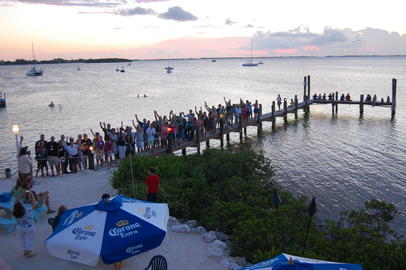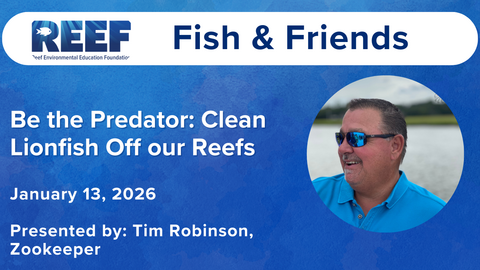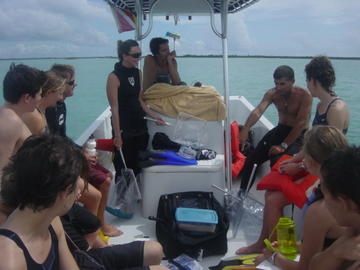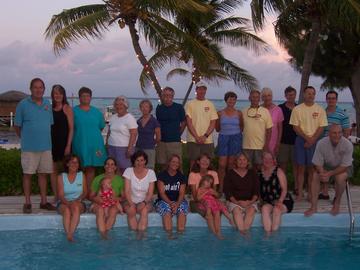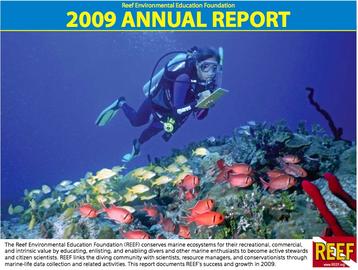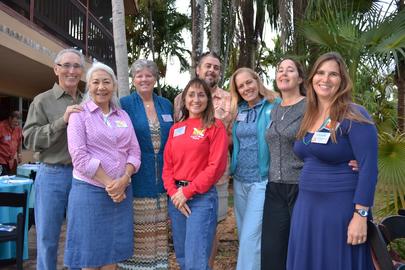REEF Fest is just ten days away! Sponsored by Capital Bank Foundation, REEF Fest is an annual celebration of marine conservation held in Key Largo, Florida, on Oct. 17-20. The event features diving, ocean-themed seminars, and social events. REEF Fest is open to the public, and most events are free to attend. To see the complete schedule, visit www.REEF.org/REEFfest.
Current search
Search found 427 items
- INVASIVE
The REEF Volunteer Fish Survey Project operates worldwide, and REEF members are located all over the globe, but our physical location - and our home since REEF was founded in 1990 - has always been in the Florida Keys. The REEF Campus in Key Largo is a visitor center and nature center, which includes the historic REEF Headquarters building, the Interpretive Center, and an outdoor oasis including a Native Plants Trail, butterfly garden, and covered picnic and gathering area.
Tim Robinson has taken on the mighty mission of tackling the invasive lionfish crisis. But that’s not all – Tim is a lifelong entrepreneur with deep roots in philanthropic endeavors. In 2021, Tim made a bold leap and snatched up ZooKeeper, transforming it from a humble, one-color, garage-built startup into a global contender in the hunting and ocean conservation arena. For the past several years, Tim has been a vibrant force, creating challenges and paving paths for others.
- Caribbean Livaboards Offering Fish Counts
- Second Advisory Board Meeting and Sustainer's Social A "Fishy" Time
- REEF Certificates of Merit Available
- Bonaire Dive Festival
- Monitoring Contracts
- MPA News
- REEF Internship
- Volunteer of the Year 1999 - Tom Isgar
- Great American Fish Count: Event Focused on Partnerships
- What's Happening in Research - Bonaire Marine Park, AGRRA, Florida Keys NMS
- NOAA's Biogeography Program Looking At REEF Data in New Ways
Following the most recent Indo-Pacific Lionfish expedition at Stuart Cove’s in Nassau, Bahamas, we kicked off the next phase of our critical research on this invasive species in Eleuthera. Supporters, Trish and David Ferguson, served as hosts for the week. Earlier this summer, REEF staff set up 11 study sites, tagging 30 fish on six different patch reef and clearing the other 5 sites of lionfish. This past week, I revisited those tagging sites and documented any movement of lionfish.
Happy New Year! We hope that all of our members had a joyous holiday season. In this first edition of REEF-in-Brief 2009 we bring you news that everyone knew was just a matter of time -- the invasive Indo-Pacific Lionfish has been confirmed in the Florida Keys. Thanks to her experience as a REEF fishwatcher and the numerous outreach stories that REEF has issued to our members, REEF surveyor Becky Fowler knew just what she was looking at last week while diving during her vacation off Key Largo, Florida.
We are excited to announce a great line-up of destinations for REEF's 2010 Field Survey Travel Schedule. These fun and educational eco-dive trips are part of REEF's Volunteer Survey Project and they are the perfect way to "Make a Dive That Counts". The week-long trips are a great introduction to fish identification for novice fishwatchers, and a fun way for experienced surveyors to build their life list while interacting with fellow fishwatchers. Trips are led by REEF staff and other REEF instructors and feature daily classroom seminars and a full diving schedule.
REEF Staff and Board members are proud to announce the release of our 2009 Annual Report. To view a PDF of the report online, click here. In this report, you will find updates on our membership, the Volunteer Fish Survey Project, regional activities, special projects (e.g. invasive lionfish and Grouper Moon), data use and publications, our upcoming plans, and finances. We are truly grateful for all your support that made 2009 such a success!
Earlier this month, for World Oceans Day, the Curtis and Edith Munson Foundation celebrated by pledging to match contributions to REEF dollar for dollar, up to $30,000! Our campaign to raise funds for protecting Nassau Grouper, controlling invasive Lionfish, and inspiring citizen science through the Volunteer Fish Survey Project is off to a great start. But we still need your help to reach our goal in the next 30 days. If you haven't yet had a chance, please contribute today.
Over 100 REEF Sustainers, marine conservationists, scientists, and prominent figures in the diving industry gathered in South Florida earlier this month to commemorate REEF's successes at the biennial REEF Sustainers Event. REEF Sustainers are donors who contribute at least $1,000 a year to support REEF's programs. REEF Board of Trustees and Staff welcomed our Sustainers and other invited guests to Mango Manor, the home of esteemed underwater photographer and REEF President, Paul Humann, for a day of presentations and camaraderie.

